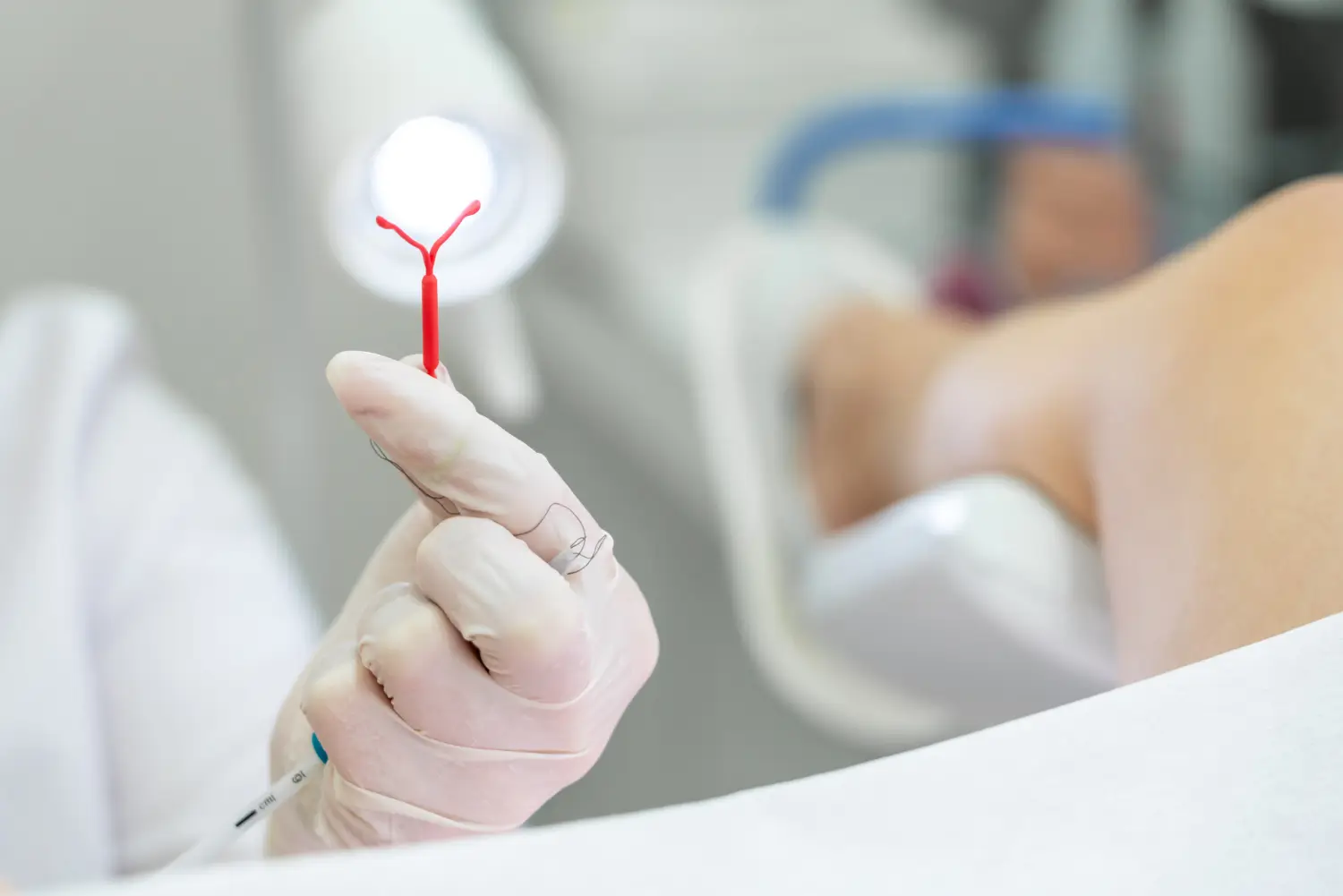
Did you know that breakthrough bleeding is a common concern among women using hormonal birth control? It’s usually a small amount of spotting at a time when you’re not expecting your period. This phenomenon occurs with various methods of hormonal birth control, such as hormonal intrauterine devices (IUDs).
Mirena, a hormonal IUD, offers long-lasting contraception. After placement, spotting and bleeding are common. Mirena’s effectiveness in preventing pregnancy remains unaffected, even during breakthrough bleeding episodes. If you’re considering Mirena, understanding its side effects is crucial.
This article explores Mirena’s impact on bleeding patterns, offering strategies to manage spotting and practical tips for a smoother adjustment period.
Key Takeaways
- Irregular bleeding and spotting are common side effects after Mirena insertion, often occurring in the first few months.
- Most women experience reduced bleeding over time, with some eventually having very light periods or none at all.
- Spotting is generally not a cause for concern, but persistent heavy bleeding should be discussed with a healthcare provider.
- Hormonal adjustments in the body cause irregular bleeding, and it typically stabilizes within six months.
- Tracking your bleeding patterns can help determine if your experience with Mirena falls within the expected range of side effects.
About: DoctorMedica is your trusted supplier of top-quality dermal fillers, viscosupplements, and more for your medical practice. We offer genuine products from leading brands at the lowest prices in the market. If you’re looking to buy Mirena wholesale for your practice, the sales representatives at Doctor Medica can give you guidance.
Why Does Mirena Cause Spotting and Irregular Bleeding?
Mirena is a small device placed inside the uterus that releases levonorgestrel, which alters the uterine lining and menstrual cycle. As your body adjusts, this can cause spotting and irregular bleeding, especially during the first 3 to 6 months. Around 20% of users may experience heavier bleeding or spotting between periods.

However, many women notice a reduction in bleeding over time, with some experiencing lighter or no periods. Levonorgestrel thins the uterine lining, leading to improved menstrual patterns. Understanding these changes helps manage expectations and assess the long-term benefits of Mirena.
What to Expect
Spotting and irregular or heavy bleeding are common after getting a Mirena IUD. This happens during the first 3 to 6 months as the body adjusts.
- In the first few weeks, spotting between periods can happen. This is light and may need only a panty liner.
- Some women may have heavy bleeding during their first few periods with Mirena. This usually gets better after 3 months.
- Around 20 percent of women see spotting or heavier periods than usual. This is part of how the body reacts to Mirena.
- Many notice their periods becoming shorter and lighter after three to six months. For some, they may stop altogether.
- Frequent light bleeding or spotting can occur along with regular periods in the initial months.
- By the end of the adjustment period, most women have less bleeding than before they got Mirena.
This pattern shows how the body adapts to Mirena over time, leading to changes in menstrual cycles that often improve after the adjustment phase.
Potential Changes in Menstrual Flow and Frequency
Mirena often makes periods shorter or lighter. Initially, spotting or light bleeding may occur. Some users might experience irregularities like heavier flows or unexpected spotting. Over time, these issues typically improve, with many women finding their periods become lighter or stop altogether. If bleeding persists or returns, consult your doctor, as individual responses to Mirena can vary.
Managing Spotting and Irregular Bleeding
Managing spotting and irregular bleeding with a Mirena IUD can be challenging, especially in the first 3 to 6 months as your body adjusts. To keep track, use panty liners and mark each day of bleeding or spotting on a calendar. This helps you observe any changes over time.

If you notice persistent or increasing spotting beyond a few months, it’s a good idea to consult a healthcare professional. Monitoring your symptoms can help determine if further medical advice is needed.
Lifestyle Adjustments

- Stay hydrated. Drinking enough water keeps your body healthy.
- Eat a balanced diet. Foods rich in iron, like spinach, can make up for blood loss.
- Exercise regularly. Light exercise can reduce spotting.
- Reduce stress. Try activities like yoga or meditation to lower stress levels.
- Track your cycle. Use an app to keep track of any changes in bleeding.
- Limit caffeine and alcohol. These can affect your hormones and bleeding patterns.
- Get enough sleep. Aim for 7-9 hours each night to help your body regulate hormones.
- Avoid smoking. Smoking can worsen bleeding issues.
- Check with a doctor before taking supplements like vitamin E or omega-3s, which might help with bleeding.
- Visit a doctor often for check-ups to discuss any ongoing issues or concerns about Mirena.
These steps may improve spotting and irregular bleeding over time, making the adjustment period easier to handle for many women using Mirena IUDs.
When to Seek Medical Advice
Knowing when to ask a doctor for help matters if spotting turns serious or keeps up. Talk to a health expert if changes in bleeding seem odd or don’t stop. Spotting and irregular bleeding are common with Mirena IUD use. But some signs mean you should talk to a doctor.
- Bleeding gets much heavier than your usual periods.
- You have spotting or bleeding for more than 6 months after getting Mirena.
- You notice sudden changes in your bleeding pattern, like new spotting between periods.
- Bad pain comes with the bleeding.
- You bleed after sex more often than before.
- Your periods stop suddenly for a few months and then start again with heavy bleeding.
- You feel tired or weak, which could mean too much blood loss.
While some bleeding changes with Mirena are normal, ongoing or severe symptoms warrant medical attention.
Conclusion
Spotting and irregular bleeding are common side effects of Mirena, with many women experiencing changes in their bleeding patterns. These issues often resolve after a few months. However, if spotting persists or if you have concerns, including potential Mirena IUD neurological side effects, it’s essential to consult your doctor. They can guide managing these symptoms and ensure your Mirena IUD is functioning correctly.
FAQs
1. What is Mirena?
Mirena is a type of Intrauterine Device (IUD), which serves as a hormonal contraceptive.
2. Is spotting a common side effect of Mirena?
Yes, spotting or irregular bleeding can be one of the common side effects experienced by some users after getting the Mirena IUD.
3. How long does the spotting last with Mirena?
The duration varies for individuals, but typically it may reduce over time as your body adjusts to the hormonal contraceptive.
4. Should I consult my doctor if I experience irregular bleeding with Mirena?
Absolutely! If you notice any changes in your regular cycle or prolonged spotting, it’s always best to seek medical advice.
References
What You Should Know About Breakthrough Bleeding With Birth Control. www.acog.org. https://www.acog.org/womens-health/experts-and-stories/the-latest/what-you-should-know-about-breakthrough-bleeding-with-birth-control
Jensen JT, Lukkari-Lax E, Schulze A, Wahdan Y, Serrani M, Kroll R. Contraceptive efficacy and safety of the 52-mg levonorgestrel intrauterine system for up to 8 years: findings from the Mirena Extension Trial. American Journal of Obstetrics and Gynecology. 2022;227(6):873.e1-873.e12. doi:https://doi.org/10.1016/j.ajog.2022.09.007
Related Articles
Joanna Carr
Radiesse Vs Juvederm: 5 Minute Read
Interested in learning more about A Brief Comparison Of Radiesse Vs Juvederm? Browse Doctor Medica's comprehensive archive of blog posts.
Joanna Carr
A Complete Guide to Belotero Under Eyes Treatment
Learn about the benefits, procedure details, potential side effects, and why Belotero is a preferred choice for addressing under-eye concerns. Know mo...
Joanna Carr
Durolane FDA Approval Status
Discover the FDA approval status of Durolane, a hyaluronic acid injection for osteoarthritis, and its impact on pain relief and joint health.


